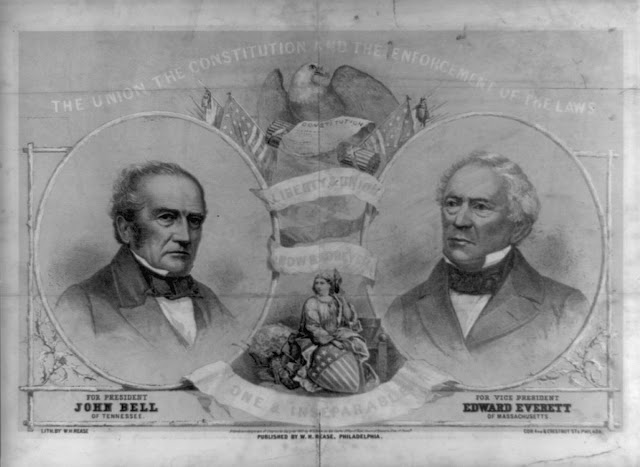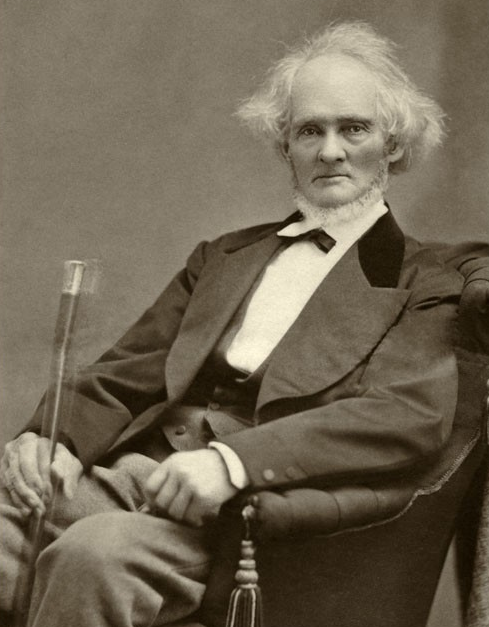Samuel McFarland, 1795 (Tenmile Creek, Penn.) - February 17, 1868 (Amwell Township, Penn.)
VP candidate for Radical Abolitionists Party (aka Liberty Party aka Union Party) 1860
Running mate with nominee: Gerrit Smith (1797-1874)
Popular vote: 171
Electoral vote: 0/303
The campaign:
The 1860 election was the last gasp of the Liberty Party. Many of their platform issues had been co-opted by the Free Soil Party and in turn by the early Republican Party. In spite of the Liberty Party barely surviving on life support, they had a real contest for the nomination between past nominees Gerrit Smith (1848, 1856) and William Goodell (1852). Several of the convention delegates were female.
Smith walked away with the prize, with Samuel McFarland as his running mate.
The Party had a name change to the Radical Abolitionists Party but on the Ohio ballot they were listed as the Union Party.
The ticket was on the ballot in two states and won a total of 171 popular votes: Ill. 35 (0.01%), Ohio 136 (0.03%)
Election history:
1843 - Pennsylvania State Legislature (Liberty Party) - defeated
Other occupations: attorney, sheep farmer, wool merchant, Washington County (Penn.) Treasurer 1829-1832
Buried: ?
Notes:
Known as Major Samuel McFarland.
Arrested and convicted for using paper money.
Willed part of his estate to the Freedmen's Bureau
Left no descendants.
One of the founders of the Washington (Penn.) Anti-Slavery Society 1834.
Along with his wife Mary was involved with the Underground Railroad at his farm northwest of Washington, Penn.
Presbyterian.
"He was strong-willed, outspoken, straightforward, aggressive man, impolitic, it may be, as some have averred that his espousal of cause injured it, but, however much his methods may have been questioned, none ever doubted his sincerity of purpose."--History of Washington County 1882.
Showing posts with label election of 1860. Show all posts
Showing posts with label election of 1860. Show all posts
Wednesday, May 22, 2019
Tuesday, May 14, 2019
Edward Everett
Edward Everett Horton
Edward Everett, April 11, 1794 (Dorchester, Mass.)– January 15, 1865 (Boston, Mass.)
VP candidate for Constitutional Union Party 1860
Running mate with nominee: John Bell (1796-1869)
Popular vote: 590,901 (12.61%)
Electoral vote: 39/303 (Ky., Tenn., Va.)
The campaign:
The short-lived Constitutional Union Party had a vague centrist platform on preserving the union but took no stand on the issue of slavery. Conservative Whigs and former members of the American (Know-Nothing) Party filled their ranks. Everett was a reluctant running mate and was not very active in the campaign.
The Party placed 4th in the popular vote but 3rd in the Electoral College winning Kentucky, Virginia, and Tennessee. They were on the ballot in more states than the eventual victor, the Republicans. Bell/Everett placed in second in many states in the South, and came very close to winning Maryland and Missouri.
Stephen Douglas, the Democratic Party nominee, placed 2nd in the popular but 4th in the electoral count, one of the rare times a mainstream political party trailed a third party.
Election history:
1825-1835 - US House of Representatives (Mass.) (National Republican/1834-1835, Whig)
1836-1840 - Governor of Massachusetts (Whig)
1839 - Governor of Massachusetts (Whig) - defeated
1853-1854 - US Senate (Whig)
Other occupations: professor at Harvard University, editor of the North American Review, United States Minister to the United Kingdom 1841-1845, President of Harvard University, United States Secretary of State 1852-1853,
Buried: Mount Auburn Cemetery (Cambridge, Mass.)
Notes:
His persistence in his student days earned him the nickname "Ever-at-it"
Ralph Waldo Emerson was one of his students.
Charles Francis Adams (another 3rd party VP nominee) was not only a student of Everett's but also
VP candidate for Constitutional Union Party 1860
Running mate with nominee: John Bell (1796-1869)
Popular vote: 590,901 (12.61%)
Electoral vote: 39/303 (Ky., Tenn., Va.)
The campaign:
The short-lived Constitutional Union Party had a vague centrist platform on preserving the union but took no stand on the issue of slavery. Conservative Whigs and former members of the American (Know-Nothing) Party filled their ranks. Everett was a reluctant running mate and was not very active in the campaign.
The Party placed 4th in the popular vote but 3rd in the Electoral College winning Kentucky, Virginia, and Tennessee. They were on the ballot in more states than the eventual victor, the Republicans. Bell/Everett placed in second in many states in the South, and came very close to winning Maryland and Missouri.
Stephen Douglas, the Democratic Party nominee, placed 2nd in the popular but 4th in the electoral count, one of the rare times a mainstream political party trailed a third party.
Election history:
1825-1835 - US House of Representatives (Mass.) (National Republican/1834-1835, Whig)
1836-1840 - Governor of Massachusetts (Whig)
1839 - Governor of Massachusetts (Whig) - defeated
1853-1854 - US Senate (Whig)
Other occupations: professor at Harvard University, editor of the North American Review, United States Minister to the United Kingdom 1841-1845, President of Harvard University, United States Secretary of State 1852-1853,
Buried: Mount Auburn Cemetery (Cambridge, Mass.)
Notes:
His persistence in his student days earned him the nickname "Ever-at-it"
Ralph Waldo Emerson was one of his students.
Charles Francis Adams (another 3rd party VP nominee) was not only a student of Everett's but also
eventually related by marriage
Promoted the work of Johann Wolfgang von Goethe who he had met in Europe in the 1810s.
His son William served in the US House of Representatives (D-Mass., 1893-1895)
Lost his 1839 bid for re-election as Gov. of Mass. by one vote.
Daniel Webster was his mentor.
Began to suffer from ill-health in the late 1840s.
Was involved in the preservation efforts of George Washington's Mount Vernon home.
Supported Lincoln's re-election in 1864, serving as an elector from Mass.
Buried in the same cemetery as B.F. Skinner, I.F. Stone, Bucky Fuller, and many other historical
Promoted the work of Johann Wolfgang von Goethe who he had met in Europe in the 1810s.
His son William served in the US House of Representatives (D-Mass., 1893-1895)
Lost his 1839 bid for re-election as Gov. of Mass. by one vote.
Daniel Webster was his mentor.
Began to suffer from ill-health in the late 1840s.
Was involved in the preservation efforts of George Washington's Mount Vernon home.
Supported Lincoln's re-election in 1864, serving as an elector from Mass.
Buried in the same cemetery as B.F. Skinner, I.F. Stone, Bucky Fuller, and many other historical
figures.
The beloved character actor Edward Everett Horton (1886-1970) was named after his father. Edward
The beloved character actor Edward Everett Horton (1886-1970) was named after his father. Edward
Everett Horton Sr. (1860-1915) was born in Maryland in May 11, 1860, two days after the
Bell/Everett ticket was nominated in Baltimore. It is reasonable to speculate the later actor was
indirectly named after Edward Everett the third party VP figure.
As a young man was interested in becoming a Unitarian minister to the point of even delivering sermons.
Had Everett been elected he would not have lived through his first term, having died a couple months
As a young man was interested in becoming a Unitarian minister to the point of even delivering sermons.
Had Everett been elected he would not have lived through his first term, having died a couple months
before the 1865 inauguration.
He delivered his own Gettysburg Address which was immediately followed by Lincoln at the same
He delivered his own Gettysburg Address which was immediately followed by Lincoln at the same
event.
Sunday, May 12, 2019
Joseph Lane
Joseph Lane, December 14, 1801 (Buncombe County, NC) – April 19, 1881 (Roseburg, Ore.)
VP candidate for Constitutional Democratic Party 1860
Running mate with nominee: John C. Breckinridge (1821-1875)
Popular vote: 848,019 (18.10%)
Electoral vote: 72/303 (Ala.,Ark.,Del.,Fla.,Ga.,La., Md., Miss., NC, SC, Tex.)
The campaign:
What can you say about an election that was followed by a bloody Civil War?
Simply put, the Constitutional Democratic Party was a classic splinter third party, formed by a bloc of delegates who were not satisfied with the mainstream nominee (Stephen Douglas). The pro-slavery Southern Democrats placed third in the popular vote but second in the electoral tally. Of the 11 states they took, only two of them had all four of the major parties on the same ballot. The Republicans were not offered as a choice in Dixie. Breckinridge/Lane nearly won Virginia, Tennessee and Oregon and also were the runner ups in Kentucky.
A longshot "Fusion" scheme in New York by Democrats would have resulted in the election being deadlocked in the Electoral College and through a complicated series of political acrobatics, Lane would be elected President by the US Senate.
Election history:
1822-1823 - Indiana House of Representatives (Democratic Party)
1830-1833 - Indiana House of Representatives (Democratic Party)
1838-1839 - Indiana House of Representatives (Democratic Party)
1839-1840 - Indiana State Senate (Democratic Party)
1844-1846 - Indiana State Senate (Democratic Party)
1851-1859 - Delegate to the U.S. House of Representatives (Oregon Terr.) (Democratic Party)
1859-1861 - U.S. Senate (Oregon) (Democratic Party)
Other occupations: flatboat pilot, militia captain, US Army Brigadier General, appointed Governor of Oregon Territory 1849-1850, Oregon Superintendent of Indian Affairs, Acting Governor of Oregon Territory for three days 1853,
Buried: Roseburg Memorial Gardens, Roseburg, Ore.
Notes:
Served in the US-Mexican War and was wounded.
Wounded in conflicts with Native Americans in Oregon.
Baptized as a Catholic in 1867 but apparently renounced the faith shortly before his death.
Supported the Confederacy but remained in Oregon, ending his political career.
His son Lafeyette Lane served in the US House (D-Ore.) 1875-1877 and his grandson Harry Lane
was Mayor of Portland and a US Senator (D-Ore.) 1913-1917
Cousin to David Lowry Swain (1801-1868) who was born in the same log cabin and served as
Governor of NC as a Whig (1832-1835)
Said to have continued to have kept slaves even in Oregon and after the Civil War.
His son John Lane served in the Confederate military forces.
Lane had made some movement after his 1860 loss to help establish a pro-slavery Pacific Republic in
Oregon and north California that would expand the concept of legal human bondage to Asians,
Hawaiians, and Pacific Islanders as well as African Americans.
Subscribe to:
Comments (Atom)





















